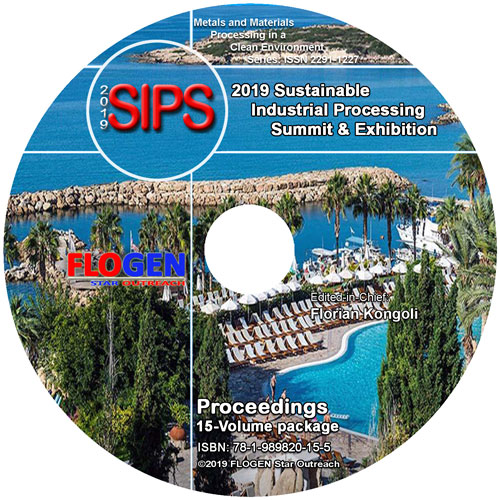2019-Sustainable Industrial Processing Summit
SIPS2019 Volume 12: Energy Production and Secondary Batterie
| Editors: | F. Kongoli, H. Dodds, M. Mauntz, T. Turna, K. Aifantis, A. Fox, V. Kumar |
| Publisher: | Flogen Star OUTREACH |
| Publication date: | 20 December 2019 |
| Pages: | 112 pages |
| ISBN: | 978-1-989820-11-7 |
| ISSN: | 2291-1227 (Metals and Materials Processing in a Clean Environment Series) |

CD shopping page
Roles of Ni, Co and Cu Monometallic Catalysts Supported on ZrO2 for Green Diesel Production via the Palm Oil Hydrodeoxygenation
Nikolaos Charisiou1; Steven J. Hinder2; Mark A. Baker2; Kyriaki Polychronopoulou3; Maria A. Goula1;1LABORATORY OF ALTERNATIVE FUELS AND ENVIRONMENTAL CATALYSIS, DEPARTMENT OF CHEMICAL ENGINEERING, UNIVERSITY OF WESTERN MACEDONIA, KOZANI, GREECE, Kozani, Greece; 2THE SURFACE ANALYSIS LABORATORY, FACULTY OF ENGINEERING AND PHYSICAL SCIENCES, UNIVERSITY OF SURREY, GUILDFORD, UK, Guildford, United Kingdom; 3KHALIFA UNIVERSITY, Abu Dhabi, United Arab Emirates;
Type of Paper: Regular
Id Paper: 249
Topic: 17
Abstract:
Energy demand in the world is expected to increase by 59% by the year 2035 [1]. In addition, liquid transportation fuels from renewable resources are urgently needed due to the depletion of fossil resources. During the last 10 years intensive research efforts on biofuels, among them only green diesel, which can be synthesized either via catalytic hydrodeoxygenation or deoxygenation of triglycerides and fats, exhibits the same fuel properties as conventional diesel, since it has a similar composition. On the other hand, ethanol and butanol exhibit lower heating values and can suffer from incomplete burning thus forming oxygenated, harmful, gaseous by-products [2]. Moreover, biodiesel consisting of fatty acid methyl esters (FAMEs) has low oxidative stability, high viscosity and poor cold weather performance and is incompatible for large-scale use in conjunction with fossil fuels [3].
In the present work, we prepared ZrO2-supported Ni, Co and Cu monometallic catalysts for the production of green diesel via hydrodeoxygenation of palm oil. The catalysts were prepared by the wet impregnation method and had the same metal loading (8 wt.%). The physical and chemical properties were determined by applying several characterization techniques including BET, XRD, NH3/CO2-TPD, TPR, XPS and TEM. Catalytic deoxygenation experiments were carried out in a fixed bed reactor (Autoclave Engineers BTRS) equipped with an HPLC pump. The SDO experiments were conducted using different operating parameters for the Ni/Zr catalyst, as follows: T=250-375°C, P=20-30 bar, LHSV=1.2-2.4 h-1 and H2/oil=250-2000 cm3/cm3, while for the Cu/Zr and Co/Zr samples the following operating parameters were used: T=300-400oC, P=30 bar, LHSV=1.2 h-1 and H2/oil=1000 cm3/cm3.
The results shows that the recommended conditions for the Ni/Zr were: I�=300 I�C, P = 30 bar, LHSV = 1.2 h-1, H2/oil ratio = 1000 cm3/cm3. Specifically, Palm oil was totally converted at 300 &#o176;C and the main reaction products were C15 and C17, with yields of 16 and 49 mol%, respectively, while C15-C18 n-alkane's yield was equal to 88 mol%. By comparing the three catalysts the deoxygenation activity decreased in the order of C15-C18 n-alkane's yield Ni > Cu > Co when compared at the same reaction temperatures. Also, to understand the roles of the three catalysts on the activity and selectivity in the deoxygenation reaction, the contributions of HDO and deCOx were estimated based on the mole balance corresponding to fatty acids in the oil feed. The Ni and Cu catalysts were favorable to the deCOx routes, whereas HDO was dominant over the Co catalyst.
Keywords:
Energy; Fuels; Oil; Sustainability;References:
[1] X. Li, X. Luo, Y. Jin, J. Li, H. Zhang, A. Zhang, J. Xie, Renew. Sustain. Energy Rev. 82 (2018) 3762-3797.[2] S. Douvartzides, N.D. Charisiou, K. N. Papageridis, M.A. Goula, Energies 12(5), 809 (2019).
[3] N.D. Charisiou, K. Polychronopoulou, A. Asif, M.A. Goula, Surf. Coatings Technol. (2018).